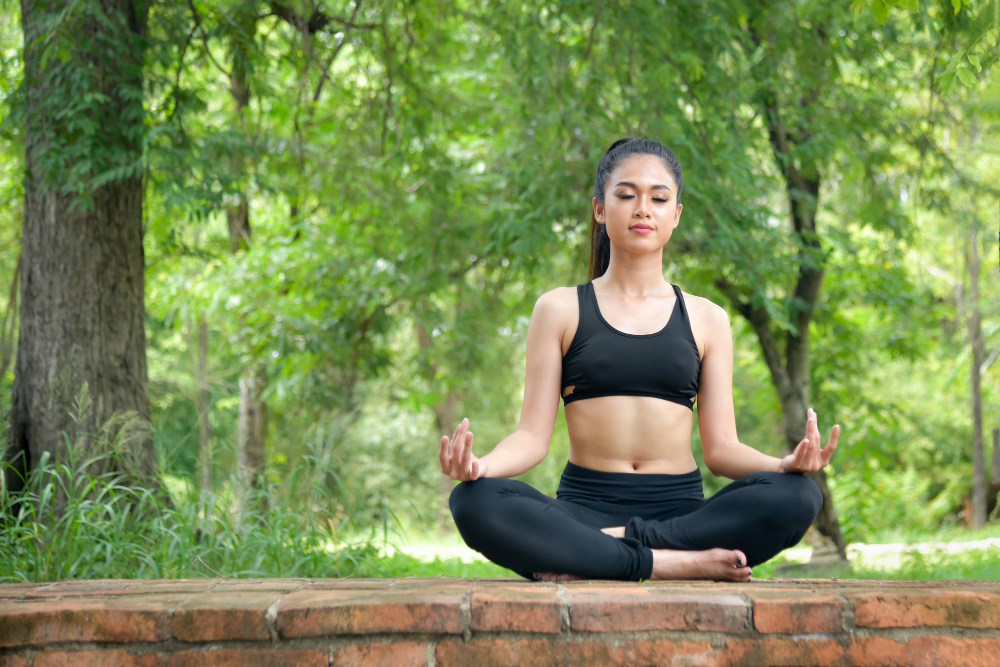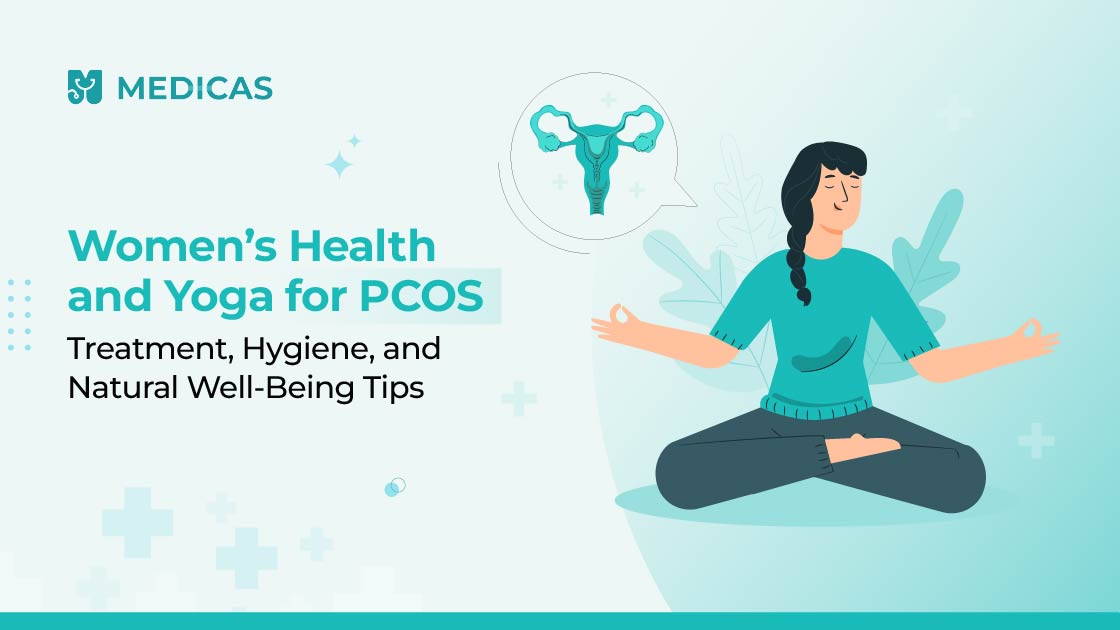What is PCOS? Symptoms, Causes, and How Yoga Supports Women’s Health
Polycystic Ovary Syndrome (PCOS) is a hormonal disorder that affects women of reproductive age. It leads to irregular menstrual cycles, excessive androgen levels, and polycystic ovaries. Symptoms include:
- Irregular periods
- Acne and oily skin
- Weight gain or difficulty losing weight
- Thinning hair or male-pattern baldness
- Mood swings and anxiety
Yoga, when combined with lifestyle changes and personal hygiene, can play a powerful role in managing PCOS symptoms, promoting hormonal balance, improving fertility, and reducing stress

Understanding PCOS: Symptoms, Causes, and Natural Treatment Options
A hormonal imbalance that impacts women in their reproductive years is known as Polycystic Ovary Syndrome (PCOS). It occurs when a woman’s ovaries produce high levels of androgens (male hormones) and can lead to a range of symptoms, including irregular periods, acne, and weight gain. Yoga can be an effective way to manage PCOS symptoms, as it can help reduce stress, balance hormones, and promote overall health and well-being.
Yoga for PCOS: Poses, Benefits, and Hormonal Balance Techniques
Yoga is a gentle and effective form of exercise that can help women with PCOS manage their symptoms. Here are some of the benefits of practicing yoga for PCOS:
Stress Management Techniques Using Yoga and Mindfulness for Women
Stress can be a major contributor to PCOS symptoms. Yoga is known for its ability to reduce stress and promote relaxation, which can help balance hormones and manage PCOS symptoms.
Yoga to Balance Hormones and Improve Emotional Well-Being
Certain yoga poses, such as the downward dog, can help stimulate the thyroid gland and regulate hormones. This can help balance the levels of androgens in the body and reduce PCOS symptoms.
PCOS Weight Loss Tips: Yoga and Lifestyle Changes That Work
Many women with PCOS struggle with weight gain. Yoga can help manage weight by promoting physical activity and reducing stress, which can lead to better eating habits and weight loss.
Personal Hygiene for Women: Menstrual, Intimate, and Feminine Care Tips
Maintaining proper hygiene is essential to promote overall health and well-being. Below are a few recommendations to ensure you maintain good hygiene practices:
Feminine Hygiene Tips: Hand Hygiene and Germ Prevention for Women
Hand hygiene is crucial for preventing the spread of germs and diseases. Regularly washing your hands with soap and water, particularly prior to meals or following restroom use, is crucial for maintaining proper hygiene.
Safe Sex Practices and Vaginal Health Tips for Women
By practicing safe sex, you can minimize the risk of contracting sexually transmitted infections (STIs) and also prevent their spread to others. Use condoms or other barrier methods to reduce the risk of contracting an STI.
Menstrual Hygiene Practices for a Healthy Reproductive System
Proper menstrual hygiene is essential for preventing infections and other complications. Change your pads or tampons every 4-6 hours and practice good genital hygiene during your period.
Best PCOS Diet Plan: Foods to Eat and Avoid for Hormonal Health
Diet plays a key role in managing PCOS symptoms and promoting hormonal harmony.
Foods to Eat:
- Leafy greens and cruciferous vegetables
- Omega-3 rich foods (flaxseed, walnuts, salmon)
- Whole grains (quinoa, millet)
- Berries and citrus fruits
- Cinnamon and turmeric (natural anti-inflammatories)
Foods to Avoid:
- Refined carbs (white bread, pasta)
- Sugary snacks and sodas
- Dairy (for some women)
- Processed meats
💡 Tip: Combine your PCOS diet plan with gentle exercise and stress management techniques for maximum benefit.
Home Remedies and Natural Ways to Cure PCOS Without Medication
While PCOS can’t be cured, symptoms can be significantly managed with consistent lifestyle changes. Here are a few PCOS home remedies:
- Spearmint tea: Helps lower testosterone levels
- Apple cider vinegar: May improve insulin resistance
- Cinnamon: Helps regulate menstrual cycles
- Fenugreek seeds: Balances hormones
- Yoga and pranayama: Natural ways to manage stress and support endocrine health
Always consult your gynecologist before trying herbal or home-based PCOS remedies.
Conclusion:
Maintaining good health and well-being is essential for women, especially those with conditions such as PCOS. Yoga can be a powerful tool for managing PCOS symptoms, while proper hygiene can help prevent the spread of disease and promote overall health. By incorporating yoga and good hygiene practices into your daily routine, you can take control of your health and well-being.
Frequently Asked Questions (FAQs)
1. What is the best PCOS diet plan to manage hormonal imbalance?
A PCOS diet plan should focus on low-glycemic foods, high-fiber vegetables, lean proteins, and healthy fats. Avoid refined sugar, processed carbs, and excessive dairy. This helps regulate insulin and support hormonal balance.
2. What are the top PCOS home remedies for natural relief?
Effective PCOS home remedies include spearmint tea, cinnamon, apple cider vinegar, and fenugreek seeds. These support hormone regulation, improve insulin sensitivity, and may reduce PCOS symptoms naturally.
3. Which yoga poses are most effective for PCOS relief?
Best yoga poses for PCOS include butterfly pose, bridge pose, cobra pose, child’s pose, and legs-up-the-wall. These poses support hormonal balance, reduce stress, and improve blood flow to reproductive organs.
4. What are the benefits of mindfulness for women’s health?
Mindfulness reduces cortisol, improves sleep, supports emotional well-being, and helps manage hormonal imbalances. It’s especially helpful for women dealing with PCOS, anxiety, or menstrual irregularities.
5. Which yoga practices help with anxiety and depression in PCOS?
Yoga Nidra, alternate nostril breathing, cat-cow stretch, and meditation are effective for anxiety and depression in PCOS. These practices promote relaxation and support mental health in women.
6. How does yoga support vaginal health and intimate hygiene?
Yoga improves pelvic circulation, supports hormonal balance, and enhances immunity. This contributes to better vaginal health, menstrual hygiene, and intimate hygiene for women.
7. What are the top women’s health tips for managing PCOS naturally?
Key women’s health tips for PCOS include regular yoga, a hormone-friendly diet, stress management techniques, good hygiene, quality sleep, and consistent follow-ups with specialists.
Related Blogs
Disclaimer
Medical Advice: The information provided in this blog post is for educational purposes only and should not be considered as a substitute for professional medical advice, diagnosis, or treatment. Always consult with a qualified healthcare professional for personalized guidance regarding your specific medical condition.
Accuracy of Information: While we strive to provide accurate and up-to-date information, the field of medicine and viral fevers is constantly evolving. The content in this blog post may not reflect the most current research or medical guidelines. Therefore, it is advisable to cross-check any information provided with reliable sources or consult a healthcare professional.
Individual Variations: The symptoms, causes, treatment options, and preventive measures discussed in this blog post are general in nature and may not apply to everyone. It is important to remember that each individual’s situation is unique, and personalized medical advice should be sought when making healthcare decisions.
External Links: This blog post may contain links to external websites or resources for additional information. However, we do not endorse or have control over the content of these third-party websites. Accessing these links is done at your own risk, and we are not responsible for any consequences or damages that may arise from visiting these external sources.
Results May Vary: The effectiveness of treatment options or preventive measures mentioned in this blog post may vary from person to person. What works for one individual may not work the same way for another. It is essential to consult with a healthcare professional for personalized advice tailored to your specific needs.



